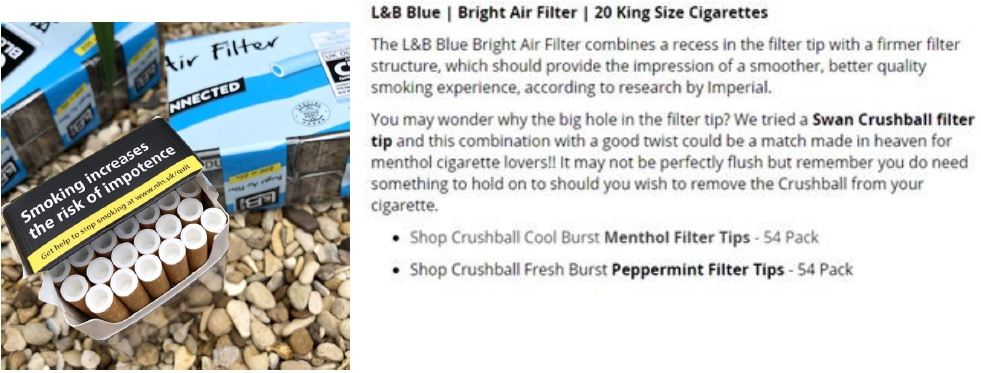Sarah Dance and Karen Evans-Reeves
A ban on characterising flavours in tobacco products (including menthol), as part of the European Union’s revised Tobacco Products Directive (or TPD2), was introduced in the UK in May 2020. Flavourings, particularly menthol, appeal to young people and are erroneously perceived as less harmful.
Menthol cigarettes represent 10% of the global cigarette market, and represented 21% of the UK market prior to the ban. Globally, use is highest in the Philippines where 60% of the market is menthol.
The World Health Organisation (WHO)’s Framework Convention on Tobacco Control, the world’s first global public health treaty, recommends banning menthol tobacco products. Numerous countries, including Brazil and Canada, have done so. EU legislation prohibits menthol as a characterising flavour but not as an ingredient in cigarettes, roll-your-own tobacco, papers or filters, and this ban does not extend to cigars, cigarillos or other accessories such as flavour infusion cards. Canadian legislation, for example, is more comprehensive, prohibiting menthol as an ingredient in cigarettes, most cigars, papers and filters.
One year after the Canadian ban in 2017, 24% of menthol smokers in Ontario had quit smoking. In England, 17.5% of menthol smokers said they would quit following the flavourings ban in May 2020.
Why ban menthol?
Menthol increases smoking uptake and makes it harder to quit.
The anaesthetic effects of menthol in cigarettes enable smokers to inhale cigarette smoke more deeply into the lungs, thereby increasing exposure to the harmful substances in tobacco smoke. Paradoxically, the cool, numbing properties of menthol may contribute to the common, but inaccurate, perception of menthol cigarettes as less harmful than non-menthol cigarettes. This facilitates uptake of smoking and makes it harder to quit.
Menthol appeals to youth.
In the United States, menthol smoking is highest amongst young people aged 12 to 17, who are more likely to continue smoking and experience greater nicotine dependence than young non-menthol smokers. Despite a global decline in smoking, the number of young people smoking menthol cigarettes has not decreased.
Tobacco companies have used menthol to target African Americans.
Tobacco companies target menthol cigarettes towards African American communities. Higher rates of menthol smoking amongst young Black Americans may explain why they experience greater tobacco-related harm than their White counterparts, despite having lower overall smoking rates. 70% to 90% of Black smokers in the U.S. smoke menthol cigarettes and 44% of Black smokers in the U.S. say they would attempt to quit smoking if menthol cigarettes were banned.
How have tobacco companies responded to the ban?
Tobacco companies have long harnessed consumers’ misperceptions about menthol to appeal to new populations of young smokers – a key strategy to securing profits. Tobacco companies attempted to undermine the ban in Canada by heavily promoting menthol capsule cigarettes prior to the ban and thereafter by introducing packaging, filter tip colours, and text descriptors that conveyed menthol-like qualities. Now, following the UK menthol ban, tobacco companies continue to evolve and are using ever more sophisticated tactics to exploit loopholes by introducing new products that fall outside the ban, for example accessories sold separately from cigarette packs such as menthol filters (including ones that can slot into filter holes in cigarettes, see Image 1), menthol capsules and even menthol ‘flavour infusion’ cards that can be inserted into packs of cigarettes which take on the flavour and aroma of the card, as well as menthol flavoured cigarette-like cigarillos complete with flavour capsules.


Furthermore, the industry used the four year ‘phase-out period’ in the UK to promote new menthol products to retailers through the retail trade press, instead of preparing for the ban by phasing out menthol cigarettes and roll-your-own tobacco. This likely contributed to the increased market share for menthol and capsule cigarettes seen in the UK during this period. Philip Morris International (PMI), one of the largest transnational tobacco companies, also set up a website informing smokers about the ban whilst directing them to alternative products, such as menthol-flavoured heated tobacco products.
Determined not to lose any customers in response to the menthol ban, PMI, British American Tobacco and Japan Tobacco International have all promoted heated tobacco and other products, for which menthol is still permitted.
Could Brexit remove the ban?
The UK government’s most recent Tobacco Control Plan highlights Brexit as an opportunity to review EU tobacco control regulations and identify opportunities for deregulation as a means to improve public health, particularly around e-cigarettes. The current Tobacco Control Plan does not suggest anywhere that the menthol ban is up for review. However, the Tobacco Control Research Group at the University of Bath has found proponents suggesting on Twitter that the menthol ban may be repealed with Tweets such as “Menthol cigarettes and 10 pack ban could be DITCHED – thanks to Brexit” and “Brexit means minty cigarette ban is scrapped. That makes it all worthwhile”.
Much of the Twitter activity took place around 23 August 2016, and promoted one of two media articles (see here and here) which suggested that the menthol ban in the UK might be reversed post-Brexit. Both stories stated that this suggestion came from a source within the UK’s Department of Health. When approached for comment the Department of Health responded that it is committed to the continuation of the menthol ban after the end of the Brexit transition period. The flavourings ban was written into UK law from 1st January 2021.
Some media outlets have omitted the evidence supporting the ban
In their coverage of the story, different news publications presented the evidence and rationale for the flavourings ban in very different ways. This is important because media coverage of tobacco control policies influences smokers’ support for policies, attitudes towards smoking and behaviour.
An article by The Independent, which has 6% of the national newspaper readership, refers to evidence that menthol cigarettes ‘make it easier to start smoking and are popular with young people’ to explain why the ban is happening.
In contrast, an article by The Sun, which has 22% of the national newspaper readership, states that the ‘draconian’ ban was introduced because “Brussels…believed their “pleasant flavour” could attract people to take up smoking. No reference to research or evidence is made. In fact, tobacco control regulations are referred to as ‘unnecessary and meddlesome’ and part of ‘nanny state measures’. The article also quotes an opinion from the Institute of Economic Affairs, a think tank with financial links to tobacco companies.
At best this is an innocent omission by the article’s author. Nevertheless, the coverage in The Sun aligns with the tobacco industry’s narrative. In a submission about TPD2 to the UK government in 2014, PMI said that the menthol ban ‘lacks evidence’ and would not improve public health, in contradiction to the available evidence and evaluations of other similar bans.
The UK Government’s ambitions for post-Brexit tobacco control policy will be revealed in its new Tobacco Control Plan due in July 2021. Brexit may be an opportunity to close loopholes that the industry has been exploiting to circumvent the EU’s characterising flavours ban in the UK, as well as other areas legislated for by TPD2 including illicit trade, tax and minimum pack size. Alternatively, tobacco companies may use it to push for the weakening of existing tobacco control measures. While it is unlikely that the evidence-based characterising flavours ban will be reversed in the UK post-Brexit, minimising the evidence on the importance of this ban may contribute to misperceptions that it is over-zealous. This coupled with continued developments of smoking accessories and cigarette brands is likely to perpetuate the incorrect assumption that menthol cigarettes are a ‘healthier’ option than non-menthol cigarettes. Furthermore, by introducing more menthol variants to next generation products, tobacco companies are fervently trying to hold on to customers that may otherwise quit tobacco and nicotine products altogether.
Taken altogether, these activities to minimise the impact of the characterising flavours ban to smokers prove once again that maintaining the status quo and protecting profits remain the key motives of the tobacco industry.
Both authors work in the Tobacco Control Research Group at the University of Bath. Sarah Dance is a Health Psychology MSc graduate interested in corporate influence on health. She is currently a research assistant on the STOP Initiative. Karen Evans-Reeves is a research fellow who conducts research into policy influence by the tobacco industry, particularly its attempts to prevent public health policies or to push its for-profit agenda via third parties. Both authors have no conflicts of interest to declare.
About STOP (Stopping Tobacco Organizations and Products)
STOP is a global tobacco industry watchdog whose mission is to expose the tobacco industry strategies and tactics that undermine public health. STOP is funded by Bloomberg Philanthropies and comprised of a partnership between the Tobacco Control Research Group (TCRG) at the University of Bath, The Global Center for Good Governance in Tobacco Control (GGTC), the International Union Against Tuberculosis and Lung Disease (The Union) and Vital Strategies. For more information, visit exposetobacco.org